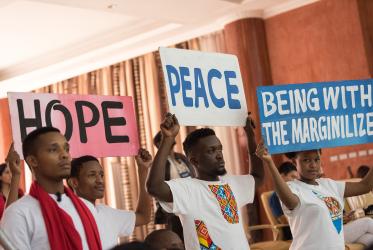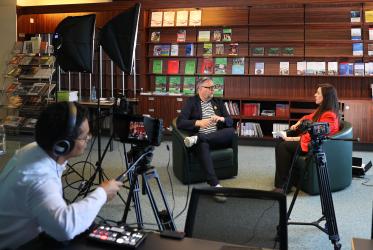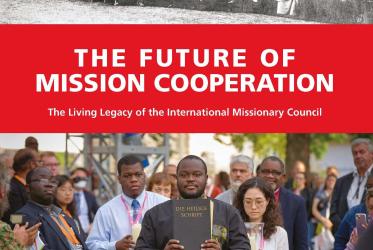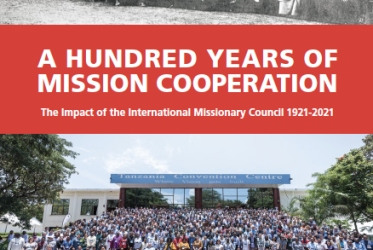A. INTENDED OUTCOMES
The upcoming centenary of the Edinburgh 1910 World Missionary Conference is proving to be a suggestive moment for many people who are seeking direction for Christian mission in the 21st century. Several different constituencies within world Christianity have begun to plan significant events in the centenary year. Since 2005 a number have been working collaboratively under the aegis of "Towards 2010". This initiative seeks to bring together representatives of many different strands of mission and church life for a well-focussed and well-organised process of preparation for the centenary. The memory of the 1910 Conference brings people together in a creative way and opens up new perspectives on mission today. The intercontinental and multidenominational initiative has the following intended outcomes:
- The churches will be provided with an opportunity to celebrate what God has done in the growth of the Church worldwide over the past century and to prayerfully commit to God the witness of the churches in the 21st Century.
- The biblical call to mission will be affirmed and articulated within our contemporary contexts in terms of mission in the world with particular focus on evangelization.
- A key conversation on mission will be initiated between e.g.
- Mission leaders from the older mission movements of the North and the new mission movements from the South and East (on dynamics of new mission movements)
- Church leaders and mission leaders (on who does what?)
- Representatives of different Christian traditions (on defining mission theology).
- Guidelines will be developed to help church and mission leaders evaluate for their own situation models of mission which are proving effective elsewhere.
- Networks will be mobilized and alliances formed so as to develop greater strategic collaboration and greater synergy in fulfilling the mission mandate.
6. Based on a critical assessment of the status of the world, a new vision in terms of God's purposes for creation in Christ and a renewed spirituality and mission ethos will be developed in the life of the churches worldwide.
B. A DECENTRALISED STUDY AND DIALOGUE PROCESS:
MISSION IN HUMILITY AND HOPE
In important ways the celebration of Edinburgh 2010 and the process leading towards it will be different from the Edinburgh 1910 Conference and study process.
- Rather than being centred in Edinburgh, a polycentric approach will be taken, both for the study process and for 2010 events which will take place in many locations around the world including Edinburgh.
- Whereas 1910 was confined to mainline Protestantism, the participants in 2010 will be drawn from the whole range of Christian traditions and confessions.
- Instead of being largely limited to the North Atlantic, there will be an intentional bias to the South, recognising that Christianity's centre of gravity has moved markedly southwards during the past century. The process will aim to be truly worldwide in its scope.
This chapter summarises some plans for reaching the intended outcomes. First, it outlines the major themes to be considered by the common study process. It will then describe how such a process could be envisaged. Finally, additional themes considered as "transversals" will be presented. The approach should not be limited to an academic one only, but should - where applicable - seek to include non-formal ways of creating action-based learning. Pilot projects can be organized / encouraged in select countries, which will engage Christians in ecumenical mission in such action-reflection processes, focused on one of the nine study themes.
The 2010 mission themes
1. Foundations for mission
The task will be to explore how a Trinitarian understanding of God as Father, Son and Holy Spirit relates to the theory and practice of mission; how the confession that God has a missionary identity impacts Christian witness; how a discernment of the Trinitarian God's inner relationships and love impacts ecclesiology, community life and society. The meaning of salvation will be considered in its biblical witness and in relation to freedom from every form of slavery in every context and culture. The interfaces between the Trinity, mission, salvation and the interpretation of scripture (hermeneutics) will have to be explored.
2. Christian mission among other faiths
This study track will investigate ways of witnessing to Christ while acknowledging the religious and cultural plurality of a world experiencing a resurgence of religious belief and an escalation of conflict. It will explore the theological meaning of religious plurality reflecting on how it bears on Christian soteriology and missiology and address questions of conversion, proselytism, dialogue and encounter. It will explore issues such as religious fundamentalism, persecution, secret' and churchless' believers and the continuing growth of many different forms of religious conviction. Studies undertaken under this theme will as much as possible be conducted together with or in consultation with representatives of other faiths.
3. Mission and postmodernities
Work under this theme will concern issues raised by the new phenomena of postmodernity in its various forms in North and South and its significance for mission. This will involve an investigation of 21st century thought structures, religious beliefs and practices as well as ethical principles in a world of information technology. It will also require consideration of the influence of post-colonialism, economic structures, internationalism and engagement (or disengagement) with institutions and particularly with institutional religion. People involved in this study will discern commonalities and particularities in postmodern developments in different regions of the world.
4. Mission and power
The task will be to discern how mission is practised in a world shaped by various forms of power: spiritual, political, military, financial and international; raising issues of culture change, human rights, ecological sustainability and inequalities in the production, distribution and consumption of resources. This track will consider tensions and asymmetries resulting from the exercise of power and how these affect the sharing and communication of the Gospel message and life. It will assess the function of both power and weakness in our understanding and practice of Christian mission.
5. Forms of missionary engagement
Work on this theme will have to start by recognising and considering the huge variety of groups, organisations, trends, methods and new expressions of church life involved in mission today. The task will then involve seeking to discern where initiative lies in today's missionary movement. It will be forward looking in assessing patterns, initiatives and developments as they emerge and consider their implications for the future. It will treat issues of mission and evangelisation strategy, diversity and cooperation and identify problems of conflict and misuse of resources.
6. Theological education and formation
The need is to examine the connection between the catechetical and missional mandates of the Church, consider how to strengthen the missional aspects of the training and formation of every church member, as well as the ordained and lay leaders. Included in the study will be educational methodologies, theological curricula, character development, spiritual formation and the contemporary context. People involved in this theme will further examine the relation between academy and society, clergy and laity, local and global issues, resources, relevance and gifts.
7. Christian communities in contemporary contexts
The task is to examine the variety of Christian communities as they draw on different traditions and engage with specific contexts. It will take cognisance of such issues as urbanisation, immigrant communities, migrant workers, affluence, poverty and virtual worlds. It will note underlying forms of Christian expression including such concepts as world view, language, customs, traditions, inculturation, transformation, etc. It will examine ways in which churches can become holistic healing and reconciling communities, expressing both the welcoming and the transforming character of Christ's Gospel. It will explore what is involved in deep-level conversion.
8. Mission and unity - ecclesiology and mission
The 1910 Edinburgh Conference is considered the starting point of the contemporary ecumenical movement, due to its insistence on the importance of unity and cooperation in worldwide mission. Today, there is a need to revisit the intimate relationship as well as underlying tensions between a focus on mission and a focus on church unity. This track will deal with various interpretations of the link between ecclesiology and mission in theological and practical terms. Interface with the work on the history of mission and ecumenism in the last century (in particular as to the evaluation of "integration" in 1961) will be key for this area.
9. Mission spirituality and authentic discipleship
Approaching mission spirituality will request to articulate a motivation and dynamic for mission that is rooted in God's trinitarian identity and led by the vision of God's kingdom. The study will deal with both individual and community forms of spirituality, drawing on the experience of the early church, of Christians from all ages, of new Christian movements, as well as of the many new churches in the South. It will seek to understand mission in relation to such concepts as new creation, spiritual gifts, renewal, reconstruction, identity, holistic witness and service, but also suffering and martyrdom. It will explore the role of the Spirit and of the Church as signs and portents of the goal of all endeavour in the glory of God.
These themes have been developed through a wide-ranging consultative process during 2004-05 and have been affirmed by many mission leaders. However, the process is an open one and the common study programme may well lead to some of the mission themes being expressed in a different way or to entirely new themes being introduced.
Decentralised study bases and a coordinating office
Recognising the worldwide character of the Church today, it is proposed that institutions, networks and agencies in different parts of the world be invited to contribute to the process in whatever way is best suited to their particular circumstances. Through a coordinating office and a central website, study of the mission themes will be developed through a diversity of contributions. Suggested ways of contributing are:
1) An institution, backed by its governing body, taking the main responsibility for one of the mentioned 2010 mission themes, including provisions for all needed personnel and financial resources. In that case, one can speak of a study commission on one of the themes.
2) Two or more institutions in different parts of the world could combine to form a study commission on one of the 2010 mission themes. Pooling resources, they could collaborate to bring a range of perspectives to the topic which no institution could achieve alone.
3) Existing networks, conferences, colloquia etc could devote part of their programme to consideration of one or more of the 2010 mission themes.
4) Churches and mission agencies could offer case studies of particular situations where significant mission engagement is taking place and which are of relevance to the 2010 mission themes.
5) Individual mission scholars and practitioners could contribute reports, essays etc which shed light on one or more of the 2010 mission themes.
It is hoped that through these different approaches, and perhaps others, many people with mission at heart will be able to contribute to the process. In order to give it coherence, there is a need for coordination. A plan is in preparation to establish a coordinating office in Edinburgh, at the site of the original 1910 Conference. In order to be as light as possible on resources, it is proposed to employ simply one coordinator. The Areopagus Foundation in Denmark has agreed to make staff time available to help support the common study process and the Commission on World Mission and Evangelism at the World Council of Churches in Geneva envisages a similar contribution. These centres will work closely together to provide informed and effective coordination.
In bringing together the diverse network of engagement with the mission themes, the attempt will be made to balance high academic standards, strong links to church life and missionary outreach, good communications infrastructure, and access to necessary financial resources. In order to allow the participation of a broad constituency, it was agreed that there would be a need to ensure the effective participation of Orthodox, Pentecostal and Roman Catholic institutions, as well as the Protestant successors of the bodies which gathered at the original 1910 conference.
Transversal themes
It was recognised that a number of "transversals" will need to be developed, i.e. important themes which will run like a thread across all "2010 mission themes". Several of these, such as Women and mission, Reconciliation and healing, or Bible and mission, may well be followed up by specially constituted groups to ensure that they take effect. This means that the distinction between the
above-mentioned "2010 mission themes" and the "tranversals" is somewhat artificial. Most mentioned themes are overlapping. For the time being the distinction is kept, but flexibility will be needed, as the processes move on. The following "transversals" have been identified:
- Women and mission
- Youth and mission
- Reconciliation and healing
- Bible and mission, mission in the Bible
- Contextualization, inculturation (gospel and cultures) and dialogue of worldviews
- Subaltern voices
- Ecological perspectives
The kind of critical analysis which would be offered by each transversal is exemplified by the following proposal in regard to Women and mission:
Women and mission
Women and mission is envisaged as a specific group that will observe the process of each of the study tracks with the brief of (a) ensuring that women's perspectives and issues are properly represented (b) effecting coordination among the individual studies on these issues and (c) dealing with issues of women and mission that do not find place elsewhere.
C. FRESH PERSPECTIVES ON MISSION:
HISTORICAL, GEOGRAPHICAL AND ARTISTIC
Three important additional approaches are being prepared by specialised groups:
- A realistic look at where we have come from by means of a penetrating and critical historical survey of some specific moments in Christian mission since 1910 which impact the present at world or regional levels.
- An informative look at where we are now by the creation of an Atlas of Global Christianity. This will show the global spread of present-day Christianity and its difference from the 1910 situation.
- An international art exhibition, on the theme "Who is Christ?", as an event for 2010. This will draw on Christian art worldwide and create an exhibition which will be accessible both physically and on the web.
D. PARTICIPATION AND PRAYER
There still exists a high degree of flexibility in planning for 2010. The hope is to generate a unique resource for the worldwide Church through a cooperative and serious study work and dialogues between representatives of various mission efforts, and to feed the fruits of this process into the major 2010 events.
Prayer for this process is the primary form of participation that is needed and invited. Since it is an initiative which is seeking to engage with today's realities at a spiritual level it will only be as strong as its life of prayer.
July 7, 2006





